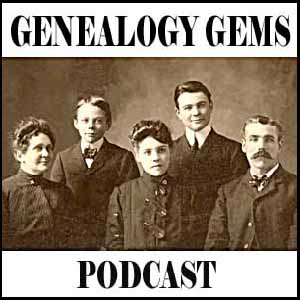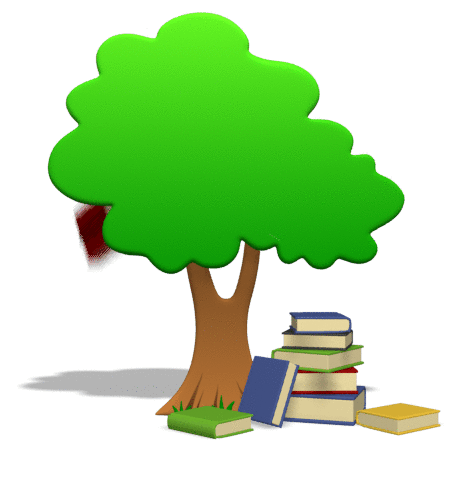by Lisa Cooke | Aug 16, 2011 |
 The Genealogy Gems Podcast Episodes
The Genealogy Gems Podcast Episodes
2008 – 2009 Season Three
Scroll to the bottom of each Podcast Show Notes Page and click the episode mp3 file to download the episode for listening. It will take a minute or two for the episode to download, and it will open in your computer’s audio program (for example: Quicktime or Windows Media Player.)
Episode 41 Listen & Show Notes
Family History Expo Wrap-Up, California Voter’s Database at Ancestry and Day of the Week Tool, Mailbox, Lulu, Valentine For You: Stories of Love
Episode 42 Listen & Show Notes
Family Tree Magazine, Genline, and another great Venice Song
Episode 43 Listen & Show Notes
Genealogy at Borders, Roots Television Interview, the new U.S. Census Bureau History Website, and Crossword Puzzle
Episode 44 Listen & Show Notes
Canadian Border Crossings, Godfrey Memorial Library, U.S. Census Bureau, and Digital Preservation Cheat Sheet
Episode 45 Listen & Show Notes
Prison stories & research, Google customization, & Free British Records
Episode 46 Listen & Show Notes
A listener’s Leatherhead, Handwriting Analysis, and Genealogy Gems Premium.
Episode 47 Listen & Show Notes
A Walk Through Childhood Memories, Family Tree and Me Displays, Girding Your Loins with James Mowatt of the Historyzine Podcast, Birthday Alarm Website, Ancestor Handwriting Analysis Winner and a new analysis of a single signature by Paula Sassi, Announcement of the NEW Family Tree Magazine hosted by Lisa Louise Cooke.
Episode 48 Listen & Show Notes
Lisa’s exclusive interview with Kathy Lennon of The Lennon Sisters. Kathy discusses her passion for family history and the Lennon family tree. Also, Paula Sassi analyzes the handwriting of our contest winner’s ancestor. Plus a new look for the Genealogy Gems Podcast Newsletter.
Episode 49 Listen & Show Notes
A great idea for genealogy societies, new Family Tree Magazine Podcast episode and Lisa’s genealogy podcasting article and videos for the magazine, Train Robbery History, Part 2 of Lisa’s interview with Kathy Lennon of the famous Lennon Sisters from the Lawrence Welk Show, Premium Discount, Handwriting Analysis opportunity and the Best Pals Contest.
Episode 50 Listen & Show Notes
The Louise Carousel, Amos Alonzo Stagg, A Little Genealogy Daydreaming with genealogy podcasters, Interview with Tim Russell of A Prairie Home Companion, America’s first radio stations, Handwriting analysis of a victim of the 1918 Spanish Flu epidemic, State Fair History, Best Pals Dolls Winner Announcement, and Upcoming Conferences.
Episode 51 Listen & Show Notes
Interview with Jim Beidler, Chairman of the FGS 2008 Conference, The History of the Ice Cream Cone, Discount on Premium Membership, Mac Minutes with Ben Sayer, The MacGenealogist, Favorite Genealogy Sayings, Census Abbreviations.
Episode 52 Listen & Show Notes
Gems From Across the Pond: Interviews with genealogy author and lecturer Rick Crume, and British Records Specialist Dr. Christopher T. Watts, and British History Podcasts.
Episode 53 Listen & Show Notes
Virginia Halloween History, Mailbox, Navy History, Interview with Yvette Arts of World Vital Records & Search Tips, Chips the U.S. War Dog, The MacGenealogist reviews iFamily for Leopard, and Name That Tune!
Episode 54 Listen and Show Notes
New podcast launch: Family History: Genealogy Made Easy, History that puts a little cash in your pocket, Interview with the Forensic Genealogist Colleen Fitzpatrick, Some Ideas on Creating family traditions and Heirlooms, The MacGenealogist, Another Linguistic History Trivia Bit, and Name That Tune Round 2!
Episode 55 Listen and Show Notes
Genealogy News, New Google Gadgets, Discover the census records you probably aren’t using, but should with Curt Witcher of the Allen County Library, Taxing Bachelorhood, and Name That Tune Round 3!
Episode 56 Listen and Show Notes
The 2009 Genealogy Gems Christmas Podcast
Episode 57 Listen and Show Notes
Frisbee & Fuller Brush History, Southern California Genealogical Jamboree, Interview with Sally Jacobs the Practical Archivist on Photo Preservation
Episode 58 Listen and Show Notes
Review of Behind the Scenes with Ancestry, Exciting New Records Online, Income Tax History, Creating a Family History Valentine, Lisa answers Listener Questions
Episode 59 Listen and Show Notes
Review of new online records, The First U.S. Presidential Photograph, Interview with Holly Hansen of Family History Expos, GenClass with Lisa Alzo, Number Please?
Episode 60 Listen and Show Notes
We celebrate the 2nd birthday of the podcast with our special guest Darby Hinton who starred in the 1960s TV show Daniel Boone. Lisa also makes recommendations to a listener on her Bristol Brick Wall.
by Lisa Cooke | Oct 1, 2014 | 01 What's New, Technology, Trees, YouTube
Recently I heard from David with this question:
“Because of your consistent message of starting a family blog [and] anecdotal success from listeners, I started a family history website. A blog just seemed too small…. The ultimate goal is to display the family information for my known relatives as well as create a site that will pop up on Google search results and hopefully put me in contact with new relatives.

My question is about displaying the family tree on the website. I want to have a page that shows my family tree. I did not know how to accomplish that, so I decided to include links to my ancestry and myheritage family trees. The problem with this method is that ancestry requires you to have an account to view the tree, and MyHeritage only shows you some of the family tree and requires an account to view the rest. This is not a great method to share the family tree with relatives because not everyone has, or wants, an account with these sites. Is there a website where I can upload my family tree’s GEDCOM file and then link to it on my website where it will display all the members of my tree?”
It’s always great to hear that Genealogy Gems is helping out. Congrats on the website David! I  recommend blogs to my readers because they are quicker and easier to set up, but in reality I would rather recommend they create a family history website like you are doing. It’s better suited for the long haul of getting your word out and connecting with others.
recommend blogs to my readers because they are quicker and easier to set up, but in reality I would rather recommend they create a family history website like you are doing. It’s better suited for the long haul of getting your word out and connecting with others.
You pose a great question, and so I did what I just coached everyone in my latest episode #171 to do: just Google it! What you are describing is a ‘website plugin’ so I Googled: family tree website plugin and…Ta-da! There are some out there.
I found one for Word Press (which is where I build my site) so I may have to give that one a try. However, since you are using Weebly I went back and added “weebly” to the search and there are definitely some hits there, though I’m not sure if they specifically include a visual tree plug in. Try the searches and see if you find something you like.
My friend Caroline Pointer has a YouTube video called “Build a Family History Website & Blog on Weebly.” Around the 5:50 mark she shows how she embedded family tree charts into Weebly. Looks like she used Scribd.
Keep up the great work on your family history site!
by Lisa Cooke | Aug 16, 2011 |
The Genealogy Gems Podcast Episodes
2009 Season Five
Scroll to the bottom of each Podcast Show Notes Page and click the episode mp3 file to download the episode for listening. It will take a minute or two for the episode to download, and it will open in your computer’s audio program (for example: Quicktime or Windows Media Player.)
Episode 81 Listen & Show Notes
Lisa’s special guest is Lisa Kudrow star of the hit TV series Friends, and the new genealogy themed television series Who Do You Think You Are?
Episode 82 Listen & Show Notes
News, Listener email, Interview with genealogist Irene Johnson (part 2) on the Family History Library.
Episode 83 Listen & Show Notes
Answers to your questions. Special Guest: Sally Jacobs, the Practical Archivist.
Episode 84 Listen & Show Notes
News and Listener Email. Special Guest: Bryce Roper Product Manager for FamilySearch, Tribute to Fess Parker
Episode 85 Listen & Show Notes
New and Listener Email. Special Guests: Susanna de Groot, Windmill Genealogy Services on Dutch research, and Janet Hovorka of Generation Maps.
Episode 86 Listen & Show Notes
Special Guest: Kendall Wilcox, The Generations Project
Episode 87 Listen & Show Notes
Special Guest: Mark Tucker, the Think Genealogy Blog on Scouting Your Ancestors.
Episode 88 Listen & Show Notes
Lots of Genealogy News, New Listener blogs, Criminal Records, New Features on Google Search, and a Musical Surprise
Episode 89 Listen & Show Notes
News, Mailbox, Forensic Linguistics for Genealogy with
Dr. Robert Leonard, Ph.D. Part 1
Episode 90 Listen & Show Notes
News, Mailbox, Forensic Linguistics for Genealogy with
Dr. Robert Leonard, Ph.D. Part 2
Episode 91 Listen & Show Notes
Podcast Episode Recorded Live at the Southern California Genealogy Jamboree. Guests: Maureen Taylor, Suzanne Russo Adams, and Chris Haley.
Episode 92 Listen & Show Notes
Canadian Research with Author Dave Obee
Episode 93 Listen & Show Notes
News, Mailbox, Interview with Genealogy Blogger Craig Manson, Locust History
Episode 94 Listen & Show Notes
News, Mailbox, Interview with Janice Nickerson Project Genealogist for Who Do You Think You Are? on the CBC in Canada.
Episode 95 Listen & Show Notes
Learn how to save your stuff with Preservation Expert Scott Haskins.
Episode 96 Listen & Show Notes
Scanner options, Photograph History, and why a listener became a genealogy blogger.
Episode 97 Listen & Show Notes
News & Mailbox, More Scanner options, Military Family Research, and Recording Interviews
Episode 98 Listen & Show Notes
The Journey Takers with Leslie Albrecht Huber, an exciting sweepstakes, and Liquid Galaxy for Google Earth.
Episode 99 Listen & Show Notes
Recorded LIVE at the California Family History Expo in Pleasanton, CA in Oct. 2010. Features The Shades of the Departed Online Magazine with special guests Craig Manson and Sheri Fenley.
Episode 100 Listen & Show Notes
A Celebration of the first 100 episodes!
 The Genealogy Gems Podcast Episodes
The Genealogy Gems Podcast Episodes

 recommend blogs to my readers because they are quicker and easier to set up, but in reality I would rather recommend they create a family history website like you are doing. It’s better suited for the long haul of getting your word out and connecting with others.
recommend blogs to my readers because they are quicker and easier to set up, but in reality I would rather recommend they create a family history website like you are doing. It’s better suited for the long haul of getting your word out and connecting with others.